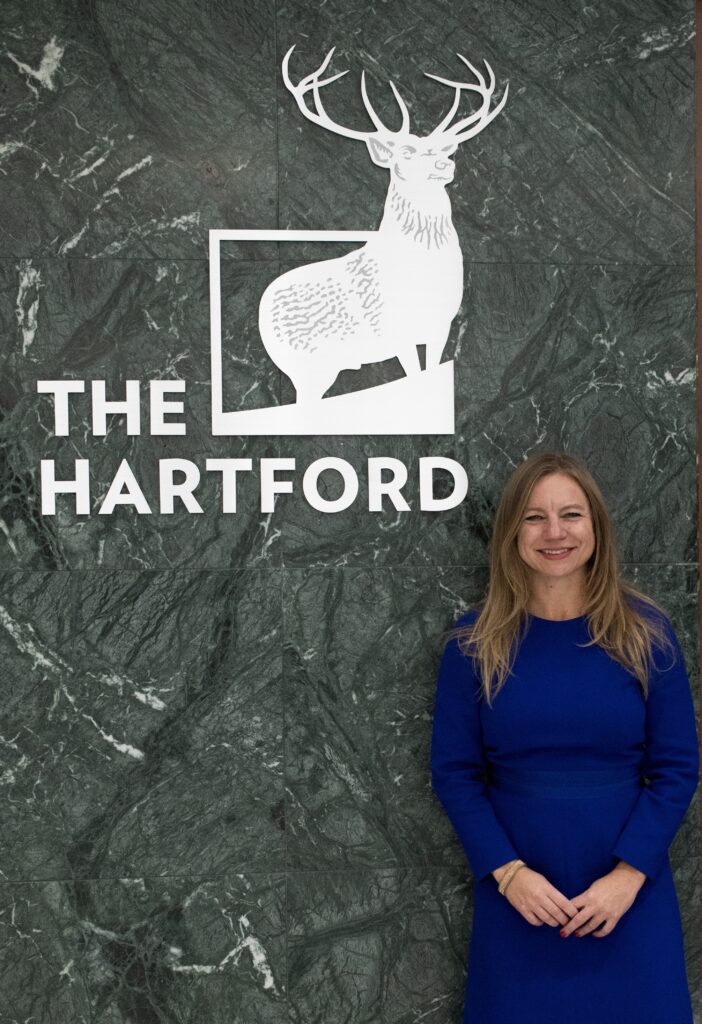
By Loretta L. Worters, Vice President of Media Relations, Triple-I
When Karla Scott first entered the insurance coverage trade, she didn’t set out with a grand plan to change into a frontrunner in marine underwriting.
“I fell into it,” she admits. Beginning at a brokerage agency targeted on logistics insurance coverage, she rapidly found a ardour for world commerce and cargo underwriting.
“It’s completely different daily,” says Scott, who’s world logistics product chief and senior managing director, Ocean Marine, The Hartford. She joined the corporate after The Hartford acquired Navigators in 2019.

“The technical work retains my abilities sharp, whereas the camaraderie and shared goal provide private {and professional} achievement.”
– Karla Scott
Scott works with shoppers, brokers, and brokers around the globe to make sure that companies have the safety they want by way of the product’s complete supply-chain life cycle. Her crew insures uncooked supplies and completed items which might be transported on containerships, planes, trains, and vans. From geopolitics to commodity shifts, it’s an ever-evolving, advanced trade that calls for fixed consciousness and adaptation.
Now, with 24 years in marine insurance coverage, Scott displays on a profession formed by resilience, robust mentorship, and a deep dedication to neighborhood. Her journey underscores each the alternatives and challenges confronted by girls in a historically male-dominated discipline.

“Disrupting commerce with…China, Canada, or Mexico would have an effect on price and the provision of insurance coverage protection.”
– Karla Scott
A Sea Change for Ladies
“Fifteen years in the past, I sat at a desk with 35 trade leaders and was the one lady,” Scott says. “However progress is occurring. Whereas marine insurance coverage stays a distinct segment inside the broader insurance coverage world, extra girls are coming into the sector and rising into management roles.”
There continues to be a gender pay hole and lack of profession development alternatives, however Scott says “a part of the rationale, frankly, is that girls have a tendency to not self-advocate. It’s important within the marine insurance coverage house to advertise your self, however girls usually really feel uncomfortable doing that. Self-advocacy is just not boastfulness. Nobody goes to place you within the highlight until you step into it. These are the talents we have to educate girls developing on this enterprise.”
Being a lady on the West Coast in an East Coast-dominated trade meant navigating extra hurdles.
“There’s a present you swim in opposition to,” she says.
Overcoming Limitations
Assist from forward-thinking male mentors and advisors helped her keep the course.
“I’m indebted to a few mentors who introduced completely different strengths,” Scott says. “I realized the best way to handle individuals, to inspire individuals, technical abilities, how necessary your status is on this trade, and the best way to push arduous and be aggressive in sure conditions and never aggressive in different conditions.”
She additionally candidly addresses the interior battles many ladies face — imposter syndrome.
“I’ve skilled it myself and have reached out to my mentors, who’re nice at listening to my frustrations,” she says. “Having a robust community may also help you’re employed by way of these points. Now that I’m on the opposite facet, I’m pushing my mentees by way of these obstacles, serving to them discover their voice and instructing them to self-advocate—abilities important to closing the gender pay hole.”
The Energy of Neighborhood
Scott’s involvement with the American Institute of Marine Underwriters (AIMU) and the Board of Marine Underwriters in San Francisco has been instrumental in her profession. She has served as president of the latter twice and speaks passionately concerning the significance of collaboration within the insurance coverage trade.
“One of the crucial distinctive elements of marine insurance coverage is that we work in partnership with opponents to unravel trade issues,” she says. “The technical work retains my abilities sharp, whereas the camaraderie and shared goal provide private {and professional} achievement.”
Commerce Tensions and Trade Impacts
As world commerce faces growing scrutiny and tariff battles, Scott is already seeing the consequences.
“Purchasers are canceling freight contracts, and volumes are dropping,” she says. “The outcome means decrease commerce quantity, greater valuation of products, and potential inflationary cycles could hit customers arduous.”
She factors out that the dearth of federal stimulus (not like in the course of the pandemic) leaves little room for financial cushioning.
“It’s a ‘maintain your breath’ type of second,” Scott says.
Cargo theft is one other rising concern.
“It spikes when inflation rises,” Scott notes, mentioning how straightforward it has change into to resell stolen items on platforms like Amazon and eBay.
Discuss of reshoring manufacturing usually overlooks the complexity of worldwide commerce.
“You may’t flip a lightweight swap and manufacture every part within the U.S.,” she explains. “Equipment to construct these items usually comes from Germany or Japan.
“Disrupting commerce with prime companions like China, Canada, or Mexico would considerably have an effect on each price and the provision of insurance coverage protection,” Scott says. “If client confidence drops and commerce volumes fall, insurance coverage demand will, too.”
Scott additionally highlights a deeper financial threat: the potential erosion of the U.S. greenback’s dominance in world commerce. “If that shifts, the American financial system might face even higher challenges.”

